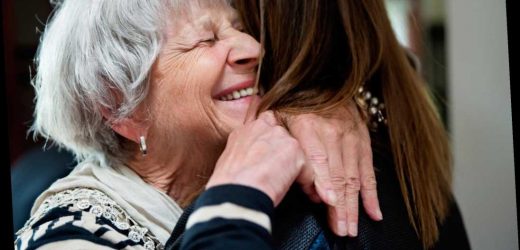SOCIAL distancing measures could be in place "for a long time to come", fuelling fears that Brits might not be able to hug their grandparents until next year.
Experts have warned that measures that are in place such as masks and the two metre rule could be around even when lockdown restrictions start to ease.
? Read our coronavirus live blog for the latest news & updates
Professor Neil Ferguson, whose early modelling played a key role in the UK's first national lockdown, said it's unlikely that Brits will be back to normal by this time next year.
Speaking on POLITICO's Westminster Insider podcast he said he "would be a fool to try and predict where we will be in six months time".
He said that the virus would be manageable with routine immunisation but said that this wouldn't be in place for around two years.
Prof Ferguson added: "My best guess is, though my fervent hope is certainly by this time next year we will be basically back to normal without any significant degree of the current controls in place.
"Whether we maintain bits of them will partly be a political decision that really depends on the situation in other areas of the world but there's a lot of uncertainty around that."
His comments come as Prime Minister Boris Johnson compiles his road map out of lockdown which is due on February 22.
It is believed that government scientists want the use of face masks and social distancing to remain in place until at least the Autumn, raising the prospect that people will still be unable to safely hug their grandparents next year.
It's not yet clear what the change in government policy will mean for different households being able to mix and sources have said that a variety of options are under consideration.
Schools are set to open on March 8 as the PM prioritises schools reopening above shops and gyms.
Sage, however, said that social distancing advice should remain in place until the end of 2021.
A source told The Telegraph that reviews into the current lockdown measures could be spaced three weeks apart – a move backed by Prof Ferguson.
The source said: "Social distancing will need to be in place for a long time to come.
"It has repercussions for the scale of any reopening. Restaurants, pubs and offices will all need to be Covid-secure."
CASES IN DECLINE
Prof Ferguson added that we would need to see a continuous decline in case rates before opening up.
He said: "'I still think despite that caution, though, certainly by May, we hopefully will be in a place much more like we were like back last October, for instance, rather than the ever-intensified social distancing we've seen since October onwards.
"They're basically halving about every 17 days at the moment or so, and that means in a month's time – the Prime Minister's talked about potentially reopening schools, we might have some bandwidth to do that, at least primary schools.
"And if we continue to see then a continued decline without large outbreaks, then perhaps starting to relax other aspects of society the following month."
He did however highlight that new variants could make this difficult.
Prof Ferguson said the Kent variant had "delayed" Brits getting out of lockdown and said that he was most concerned about data coming out of Bristol regarding the "variant of concern".
Experts previously warned that the variant discovered in Bristol could reinfect Brits who had previously contracted Covid.
Prof Ferguson added that variants like the South African and Brazilian variant could "easily develop" in the UK.
He added: "It's unlikely that we will get a strain that can't be vaccinated against and it's unlikely we will get a mutation that puts us back to square one."
Earlier this week one Sage experts warned that the lifting of restrictions would be based on how fast the vaccine is rolled out.
So far in the UK over 13million Brits have received a first dose of either the Oxford/AstraZeneca jab or the Pfizer/BioNTech offering with over half a million having received their second.
Professor John Edmunds said: "If you think about what the Government have said, their ambition is to offer all adults a vaccine dose by September I think.
"But the second dose that is being offered – certainly for AstraZeneca it looks like it's better to give it after about three months, so we would be getting our second dose in the late autumn, or the autumn, let's say.
"So I think we've got a long way to go in order to protect our entire population, and that's not including vaccinating children as well of course.
"So I think we will have to be under some kind of restrictions for some time, unfortunately."
Source: Read Full Article





